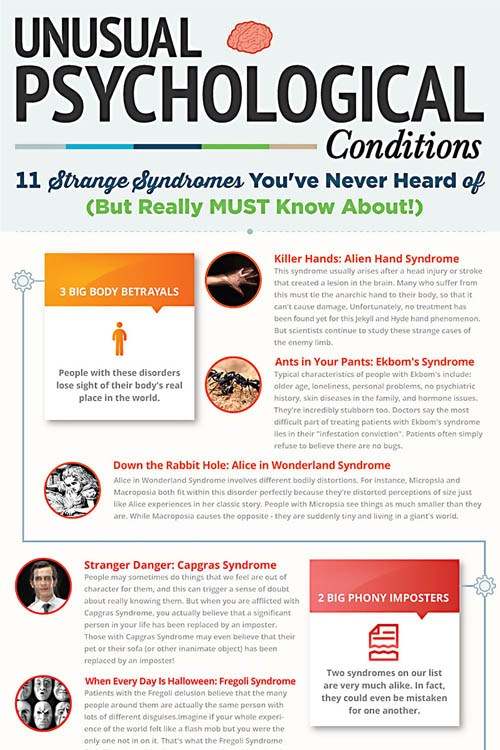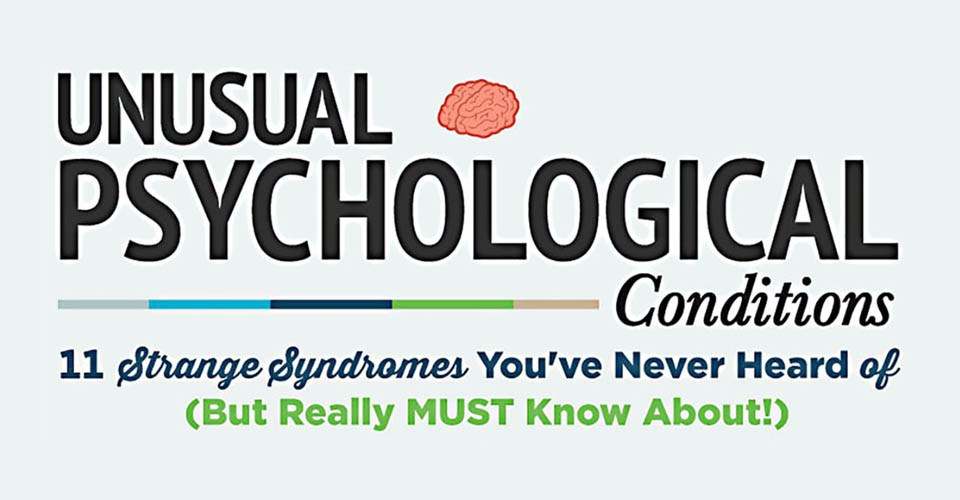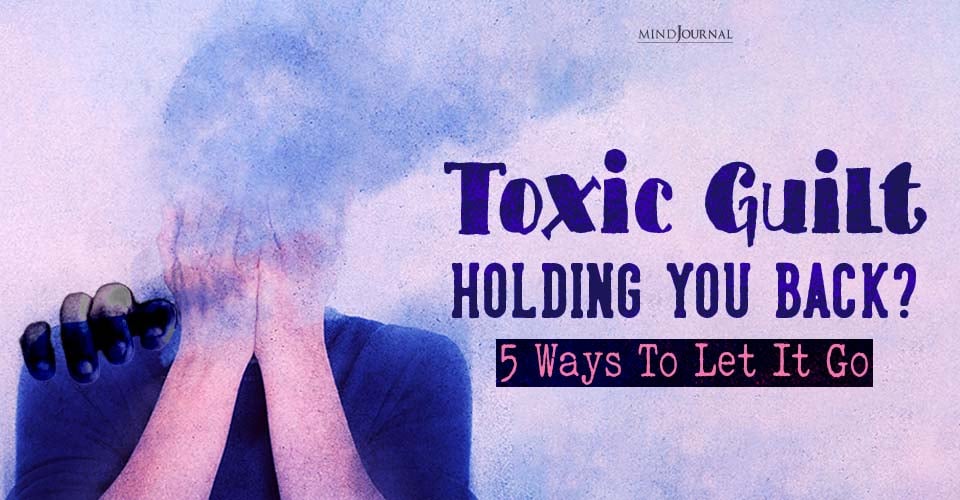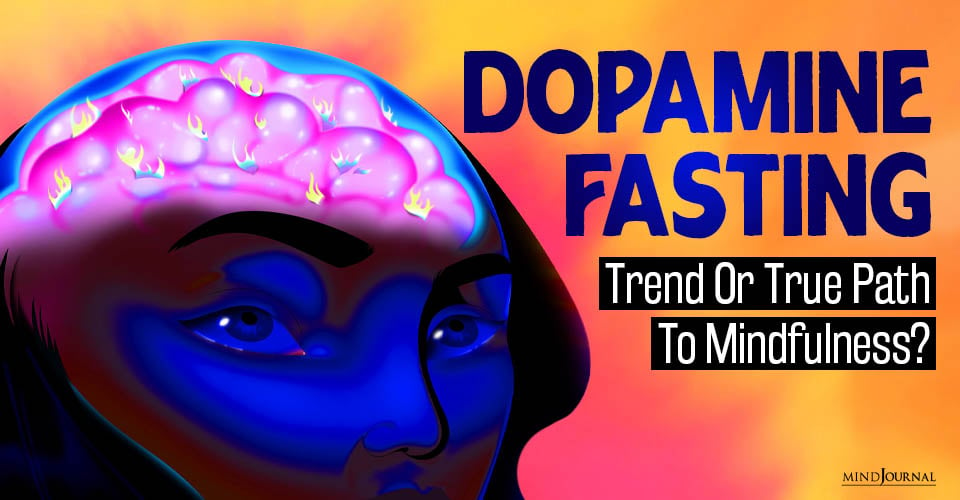According to the National Alliance on Mental Illness (NAMI), about 1/5 of the United States personally experiences a disorder in a year.
Almost 7 percent of Americans had at least one instance of major depression in the past year, and more than 18 percent experienced an anxiety disorder.
We’ve all heard of these particular mental health challenges and they’re relatively well-understood.
But let’s look at some conditions that are so unique and rare that most mental health professionals never even encounter them.

Read Learning About Mental Health: The Different Types of Anxiety Explained
3 Big Body Betrayals
If you’ve ever had food poisoning or run a marathon, you know sometimes your body can feel like the enemy. But the syndromes listed below are even more detrimental because they take the mind and body hostage with insidious abandon.
As a result, people with these disorders lose sight of their body’s real place in the world.
Read Relationship Betrayals That Have Nothing To Do With Cheating
Killer Hands: Alien Hand Syndrome
Alien Hand Syndrome is sometimes called Dr. Strangelove Syndrome after the character Peter Sellers plays in the cult movie. Turns out the hand hijinx of Peter Seller’s character refers to this real disorder.
In the movie his hand performs a Nazi salute against his will for the sake of satire. And much like satire, it’s a strong parallel to true-life. In Alien Hand Syndrome cases, a patient’s errant hand has a will and command all its own. Sometimes the hand even tries to kill its owner, choking them or stuffing bones down their throat in documented cases.
This syndrome usually arises after a head injury or stroke that created a lesion in the brain. Many who suffer from this must tie the anarchic hand to their body, so that it can’t cause damage. Unfortunately, no treatment has been found yet for this Jekyll and Hyde hand phenomenon. But scientists continue to study these strange cases of the enemy limb.
Read Narcissistic Abuse Syndrome: 10 Signs You’ve Experienced Narcissistic Abuse
Ants in Your Pants: Ekbom’s Syndrome
Ekbom’s Syndrome feels like parasitic problems to those who have it but turns out it’s all in their head. You’d think finding out from a doctor that you’re not actually infested with bugs would be a relief… But in most cases of Ekbom’s Syndrome this news is wholly rejected and sufferers usually require psychiatric care to accept it. Many never do even after years of care. They live their remaining lives with furniture and even bedding encased in sheets of plastic to fend off further infestations.
Typical characteristics of people with Ekbom’s include: older age, loneliness, personal problems, no psychiatric history, skin diseases in the family, and hormone issues. They’re incredibly stubborn too. Doctors say the most difficult part of treating patients with Ekbom’s syndrome lies in their “infestation conviction”. Patients often simply refuse to believe there are no bugs.
In fact, any indication that there might have been insects present can solidify the delusion in their mind. This can create treatment challenges. If a patient shows up with scratches all over their body and claims to be infested, of course a doctor will do an initial check for infestation. Problem is, that alone can cement the idea of the insect presence in the patient’s mind.
Down the Rabbit Hole: Alice in Wonderland Syndrome
Alice in Wonderland Syndrome involves different bodily distortions. For instance, Micropsia and Macroposia both fit within this disorder perfectly because they’re distorted perceptions of size just like Alice experiences in her classic story.
People with Micropsia see things as much smaller than they are. While Macroposia causes the opposite – they are suddenly tiny and living in a giant’s world. This syndrome also has transient episodic phases, usually not more than an hour and rarely more than a day. That’s also a lot like what Alice went through because nothing lasted very long
while in Wonderland.
Sometimes the disorder also confuses their sense of time. The afflicted can even feel like they’re levitating, they are so out of touch with what their bodies are doing under the syndrome’s spell.
Although Alice in Wonderland Syndrome is often associated with migraines and epilepsy, in some cases patients have a viral onset. Other times doctors attribute the disorder to hallucinogenic use. No matter the cause, it’s generally considered harmless so the focus is more on treating the underlying condition with antivirals, antibiotics, or epilepsy medication in those particular cases.
Read 7 Common Myths About Narcissistic Personality Disorder
2 Big Phony Imposters
Two syndromes on our list are very much alike. In fact, they could even be mistaken for one another. This is a delightful bit of irony because the whole nature of the syndromes themselves is precisely this sort of mistaken identity.
Stranger Danger: Capgras Syndrome
People may sometimes do things that we feel are out of character for them, and this can trigger a sense of doubt about really knowing them. But when you are afflicted with Capgras Syndrome, you actually believe that a significant person in your life has been replaced by an imposter.
Those with Capgras Syndrome may even believe that their pet or their sofa (or other inanimate object) has been replaced by an imposter!
Those suffering with this disorder may experience excessive amounts of anxiety and confusion as well as anger and aggressive behavior toward the perceived fake person or household item.
Imposter syndrome or Capgras delusion is named after French psychiatrist, Joseph Capgras and was first classified in 1923. It may be caused by brain damage or lesions on the brain, or by dementia or Alzheimer’s disease.
When Every Day Is Halloween: Fregoli Syndrome
Fregoli Syndrome is slightly different from Capgras but similar.
Patients with the Fregoli delusion believe that the many people around them are actually the same person with lots of different disguises.
Imagine if your whole experience of the world felt like a flash mob but you were the only one not in on it. That’s what the Fregoli Syndrome feels like… but with a lot more paranoia and less dancing.
Fregoli syndrome was first discovered in 1927 when a woman thought her favorite actresses were disguising themselves as her friends, her employers, and even strangers around her. The doctors named the condition after a famous impersonator, Leopoldo Fregoli of Italy.
Nervous Much? 3 Major Stress Syndromes
Each disorder in this next set involves a reaction to stress, whether it’s emotional trauma or as extreme as brain injury. Sometimes stress can have an impact on our behavior and beliefs. Other times it can make us talk funny.
Read 9 Traits That Promote Stress and Undercut Mental Strength At Work
Mais, Oui, Monsieur: Foreign Accent Syndrome
If you’ve ever seen the episode of Friends when Ross teaches at NYU, you’re already familiar with this strange syndrome. In the episode, Ross gets so nervous on his first day as a professor that he slips into a sprightly British accent. And yes, that’s actually a thing . . . called Foreign Accent Syndrome.
In the real world this syndrome is a little different, though. It’s usually the result of brain damage caused by a stroke or injury.
The best known case of the syndrome was reported by a Norwegian neurologist, so it’s not surprising that the brain’s neurology is intimately involved in this disorder. In fact, unlike the silly case of Ross Gellar, people who actually have FAS don’t control their accent at all. It just starts coming out when they talk and remains involuntary.
This may inhibit their natural expression in some ways or confuse friends and family for a while. But at least they don’t have to keep up a gut-busting charade in front of a college classroom for nine months.
Sympathetic Tendencies: Lima Syndrome
We’ve all heard about Stockholm Syndrome, which is when hostage victims develop a fondness for their captors. But did you know this can also develop in the other direction?
Yes, that’s Lima Syndrome.
Lima Syndrome takes its name from a hostage situation in Peru where the abductor developed sympathy for the hostage in a 1996 terrorist takedown at the Japanese embassy. The abductors ended up releasing the hostages after only a few hours. One perpetrator even referred to a hostage as “my friend” in the process.
It makes sense that in the highly charged situation of hostage-taking, the perpetrators might develop some emotional baggage. Their hearts gallop. Hair bristles on their arms.
They are probably in this situation of taking a hostage because they feel out of control and are trying to regain a sense of agency. And this is exactly what the hostage feels – out of control.
No matter what judgments one might make about a criminal act, it’s most easily defined as the behavior of a human being in crisis. Emotions are at their peak and the criminal’s in a vulnerable state. It makes sense, then, that the hostage taker may start empathizing with their hostages, who are also incredibly vulnerable.
Messed up, but totally true.
The Green Demon: Mad Delusional Jealousy Syndrome
Othello Syndrome, also known as Delusional Jealousy Syndrome, takes infidelity paranoia to the extreme.
In Shakespeare’s tragic play Othello, themes of jealousy swirl around dramatic characters until tragic consequences spill like blood onstage. But in Othello Syndrome, this isn’t mere fiction and can result in very real and often bloody consequences.
The afflicted evolve from mere accusations to then isolating, interrogating, and even physically harming their lover. That happens with absolutely zero evidence of their partner’s infidelity. Those with the disorder are completely obsessed with the idea of their love cheating and can’t let go of this belief no matter what is actually happening.
Clearly this syndrome involves more than just typical jealousy. But luckily, because it usually results from frontal lobe lesions, it’s unlikely to happen with your bae.
3 Times When A Vacation Blows Your Mind (No, Really!)
This set of syndromes stands apart because on the surface it seems sort of normal. We have all had an experience that doesn’t live up to our expectations. But these three are especially intriguing because they represent extreme examples of three seriously disturbing ways this disappointment can manifest itself.
Read Nowhere to go – MIND TALK
The Wailing Wanderer: Jerusalem Syndrome
Jerusalem Syndrome happens most often with religiously motivated travelers to the holy city.
We’ve all heard the comedic trope of the guy who thinks he’s Jesus.… Or maybe a woman who suddenly believes she’s the Virgin Mary while traipsing Jaffa Road in short shorts and high heels. Well, those guys likely have a serious case of Jerusalem Syndrome.
Jerusalem syndrome can be any form of psychotic state manifested by a visitor to the holy city.
The research on this syndrome notes that it’s most common among zealots from ultra-religious families, but sometimes it happens to regular tourists with no history of mental illness or religious fervor.
When it was much more common, about 50 years ago, there was an entire psychiatric hospital in Jerusalem designated specifically for tourists who became afflicted with this syndrome.
Stand-up comedian and actor, Marc Maron used The Jerusalem Syndrome for his first book title. Unfortunately, he regrets the title. Since not many people know about this syndrome, people assumed it was a religious book. Thus it sold fewer copies than if he’d chosen a pithier, secular title.
Fantasy in Florence: Stendhal Syndrome
Stendhal Syndrome, also known as Florence Syndrome, involves an overwhelming feeling sparked by art appreciation gone horribly awry.
As the name indicates, this syndrome often overcomes tourists in Florence, Italy, which is packed with remarkable art. Many who fall under the spell of Stendhal may faint or feel like they are flying simply because they viewed a religious painting or sculpture. Their hearts race, they sweat and get stomach cramps, and they may experience the highs of euphoria or the lows of deep depressive states. Some think they are invincible while others feel they are a persecuted victim.
An example, cited in the New York Times is Lucy, 22 years old.
A student named Lucy visits Florence, Italy, and is so taken with the sacred art she sees that she imagines seeing angels and hallucinates an entirely false (but much more romantic) history in which she is a reincarnation of an old Umbrian nun.
Certain people are more vulnerable to this sort of swooning, and being away from home and out of their element only adds to their susceptibility. Plus, the stakes are high since some people wait a lifetime to come to museums like the Medici Chapel and the Uffizi Gallery
Luckily, this syndrome usually passes after a few days. In fact, one expert in this particular disorder suggests that it can likely be avoided altogether by simply not squeezing too many museum visits into a short period of time.
That’s not an easy feat in Florence, though. It may even be harder than dealing with angel hallucinations.
A Fancy for France: Paris Syndrome
If Paris Syndrome is 100% real, I’m pitching an idea for Cinnamon Roll Syndrome. Every time I smell cinnamon rolls (mainly in airports) their heavenly aroma calls to me like a romantic spring in Paris. But then my chewy gooey roll’s flavor never delivers the glorious experience the scent advertised. Sigh. Well, this is basically what happens when you come down with Paris Syndrome, which is a form of extreme disappointment.
Of course, Paris is perfect in postcards and movies. But, in reality, cities can be crowded and hard to navigate. Certainly no vacation can salve the stab wounds of pricey tiny meals, claustrophobic hotel rooms, or stepping in dog poo eight times a day, for Parisian instance. (The French’s opinion on picking up after your pooch is “Pas vu, pas pris,” meaning not seen, not caught.)
Mainly an affliction of Japanese tourists with a romantic fascination for the city of light, Paris Syndrome sharpens the cold blade of vacation let-down. And there’s a reason it’s mainly Japanese tourists that the syndrome affects. For one thing, the Japanese have a love of all things French.
Second, Japanese culture focuses a great deal on politeness as well as putting the good of society above the needs of oneself. Thus, Paris Syndrome (or Pari shōkōgun) looks a lot like a rabid case of intense culture shock—because Paris isn’t earning any awards for its polite tolerance of tourists, or for its poopy problem.
Is it really an affliction to be disappointed in your vacation? Can culture shock like this truly qualify as a psychiatric disorder? There must be a line between mere disappointment or cultural difference and actual disorder.
Mais oui. We measure these things through mental health professionals. When enough people call upon the aid of a professional, a mere bother can mutate into a seriously strange syndrome. Plus, the fact that the Japanese embassy in Paris maintains a 24-hour emergency hotline for sufferers of Paris Syndrome says it all. Mon dieu!










Leave a Reply